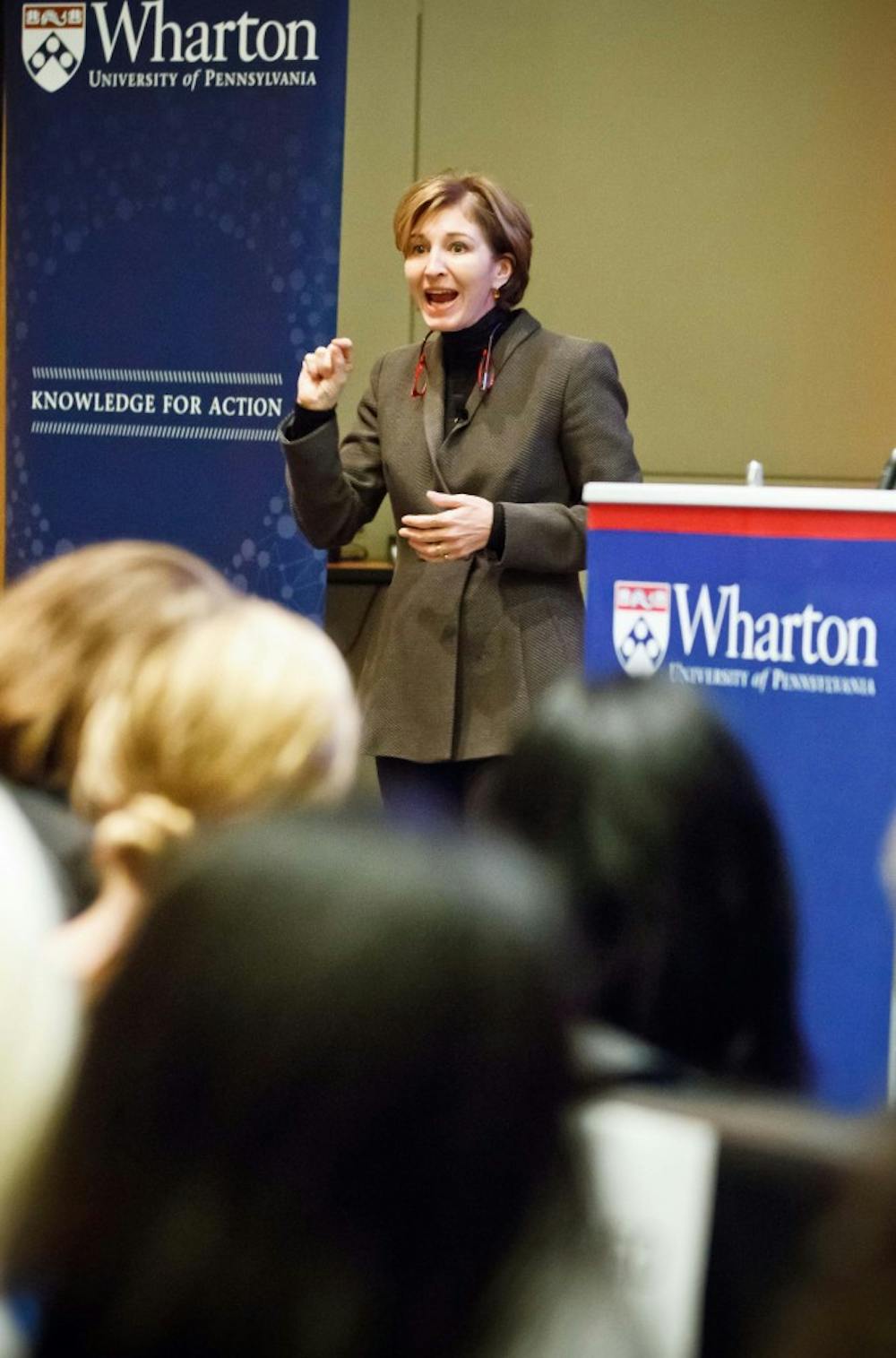
Anne-Marie Slaughter, former director of policy planning at the State Department and author of “Why Women Still Can’t Have it All,” speaks at Huntsman.
Credit: Courtesy of Tommy LeonardiAnne-Marie Slaughter, former director of policy planning at the U.S. State Department, said her son once drew her in a family portrait — as a laptop.
Both her son’s depiction and her willingness to share an intimate family anecdote well characterize Slaughter, now a professor of politics and international affairs at Princeton University. Last night, as part of the Authors@Wharton Speaker Series, she discussed her July 2012 article in The Atlantic, “Why Women Still Can’t Have It All,” offering some much-desired perspective on maintaining an optimal work-life balance.
Hosted by the Wharton Leadership Program and co-sponsored by the Wharton Work/Life Integration Project and Wharton Women in Business, the event attracted an enthusiastic crowd, filling the seats — and then the aisles — of The Dhirubhai Ambani Auditorium in Huntsman Hall. The attendees were predominantly female, though for some, including Wharton MBA student Monica Jain, this came as little surprise.
Slaughter’s article “relates to a lot of women,” said Jain, a treasurer for Wharton Women in Business, “who always have in mind how they can balance getting to the top of the business world and having a family.”
Wharton professor of management Stew Friedman, who is the founding director of the Wharton Work/Life Integration Project, made some introductory remarks, praising the speaker’s candidness and intelligence in sharing her personal life with thousands of readers.
Through her article, Friedman said, “[Slaughter] brought the sotto voce subject of balancing life and work to a loud roar.”
When she took the stage, Slaughter’s voice was gruff and nimble, though with hardly a trace of her old hometown of Charlottesville, Va., to which she made frequent reference throughout her talk.
She wanted first to explain the range and scale of reactions to her article, which “was like igniting a national therapy group,” she said.
The article has been met with both tremendous commendation and condemnation, with the harshest critics charging her with attacking feminism or discouraging young women from pursuing jobs in competitive industries.
However, Slaughter said she had neither of these intentions in mind.
The article “was not an attack on feminism,” Slaughter said. “Without feminism, I wouldn’t have my career.”
And at the writer Katie Roiphe’s contention that Slaughter was merely a perfectionist who had set unrealistic expectations for her personal and professional lives, Slaughter laughed.
“You’re only willing to do these things [if] you can give yourself some slack,” she said.
But the positive responses to her article, from women and men alike, affected her most deeply.
Slaughter described the kind of comments she received from working mothers who empathized with her message, people who believed that they had let down all the expectations of themselves.
She closed her talk with a survey of possible policies that could improve the lives of women in the workforce.
The first — a policy employed already in certain industries — was “results-only workplace environment.” Such an environment would set clearly defined assignments and deadlines for one’s work, allowing mothers to leave work on a much more flexible basis and spend time with their children.
However, these changes will not come easily. “We have a culture that tells us that the person who works the longest is the most valuable,” she said. “None of the changes are going to happen without a huge norm change.”
The Daily Pennsylvanian is an independent, student-run newspaper. Please consider making a donation to support the coverage that shapes the University. Your generosity ensures a future of strong journalism at Penn.
DonatePlease note All comments are eligible for publication in The Daily Pennsylvanian.








